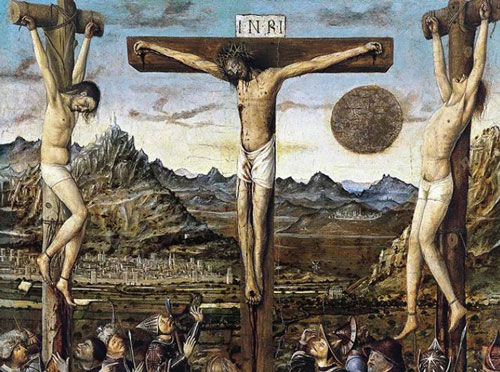
From Trinity Church, NY
“On this last Sunday in Pentecost we return to the crucifixion in the worst of days. “But Luke suddenly injects this most harrowing of moments with a glimmer of unexpected hope. Even here, before a hint of Easter, one thief — dying on his own cross — experiences revelation. Here, at the eleventh hour, he recognizes something powerful — both about himself and about Jesus.
From the Catholic Register
“His story has caused many believers to feel drawn to the one some early Christians named Dismas (Greek for “dying”).
“Dismas became quite sobered during his crucifixion. As he considered his situation, while up on his own cross, he became awash with humility and regret. This newfound attitude seemed to spur on a new hope, trust, faith and love. After Gestas (the name given to the criminal hung on the other side of Jesus) reviled Jesus, demanding that Jesus do something about their precarious situation, it was Dismas who admonished him, who stepped in and defended Jesus. It was Dismas who reminded him that they had done wrong. They deserved their punishments. Dismas was clear in pointing out to Gestas that Jesus was an innocent man and did not deserve to be the recipient of such loathsome abuse, much less subjected to a crucifixion.
“As the heart and mind of Dismas transformed, he came to know that he was next to a man of overwhelming love and power, and he decided to risk asking Jesus for an undeserved, glorious favor: that Jesus would remember him when Jesus arrived at his kingdom. Jesus’ response was striking―he promised they would be together that very day in Paradise! This phenomenal pledge probably made the pain of Dismas’s crucifixion seem less horrific, perhaps even joyful, on that traumatic day. Jesus forgiving Dismas with such ease, even though he had been a great sinner, is a wonderful sign of hope and encouragement for all.
“In his awareness of personal culpability, and Jesus’s innocence, the thief “comes to himself” like the prodigal son of Jesus’s famous parable (Luke 15:17). His identity is reframed in the light of Jesus’s identity, and what that means for all of humanity. The “penitent” thief therefore asks Jesus to “remember” him, a word that here connotes a true re-membering; the thief is aware of his once divided self and sees that Jesus — in his kingdom — can make all things whole.
From “Small Simple Ways by Vinita Hampton Wright”
“We can safely say that this thief beside Jesus was in desolation—dying and afraid. We don’t know if he made this request of Jesus out of desperation or if he experienced true faith and recognized Jesus for who he was. But the man turned to Jesus. And Jesus, dying himself, answered with generosity.
When going through desolation, we come up with all kinds of reasons not to turn to Jesus. We feel guilty—surely we brought this on ourselves, we think. Or we feel that Jesus doesn’t really care. Or we assert that many other people suffer more than we do, so we should just be quiet. At these times, we need to remember the thief on the cross and how Jesus responded to him.”
From “Crucifying the King: The Penitent Thief”
The promise is that the criminal would be “with Jesus” in paradise. Jesus’ close association with sinners and tax collectors that was part of his life, is also part of his death and his life beyond death. The word “paradise” (originally from Persia) meant “garden,” “park” or “forest”. The Greek paradeisos was used in the LXX for the “garden” in Eden, the idyllic place in the beginning where the humans walked and talked with God. Isaiah presents the “garden/paradise” of Eden as part of the future salvation (53:3). Later, some groups within Judaism considered paradise to be the place where the righteous went after death. Paul considered paradise to be in the “third heaven” (2Cor 12:4). Revelation has the tree of life in the “paradise of God” (2:7). In later chapters the tree of life seems to be located in the new Jerusalem that has come down from heaven (22:2,14,19). Perhaps as with basileia, we should think of paradeisos as something other than just a place – perhaps as a restored relationship with God.
